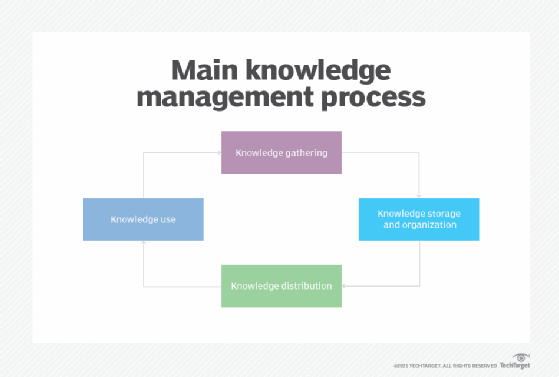
Getty Images/iStockphoto
What does a knowledge manager do?
Knowledge managers use technical skills to maintain knowledge base software and interpersonal skills to encourage employees to share best practices with each other.
As employees rely on up-to-date knowledge to do their jobs, knowledge managers ensure easy access to accurate information.
Many organizations implement knowledge management (KM) programs to capture valuable knowledge and make it readily available to workers. Knowledge managers play a key role, as they design processes to capture knowledge, maintain knowledge bases and build cultures of knowledge sharing across their organizations. The role requires a combination of content management and communication skills, and most employers expect candidates to have a bachelor's degree in a related field, like content management or library science.
Explore the key roles, skills and educational requirements of a knowledge manager.
What is a knowledge manager?
A knowledge manager is a professional who designs and implements processes to capture, store and distribute corporate knowledge, which is meaningful information that organizations gain through experience. They build and maintain knowledge bases and encourage collaboration between employees and departments. The role is often full-time, yet some organizations appoint workers to take on the role part-time or in addition to their full-time responsibilities.
5 responsibilities of a knowledge manager
Knowledge manager roles can vary in their responsibilities depending on an organization's size or industry. Yet, most knowledge managers design KM processes, maintain knowledge bases and curate content.
1. Create processes for knowledge capture
An effective KM program requires organizations to capture tacit knowledge, which lives inside employees' heads, and turn it into explicit knowledge, like training documents. Tacit knowledge includes soft skills and insights gained over time, which can be a valuable resource. Yet, it often remains siloed in individuals' minds or small teams. A knowledge manager facilitates and designs processes to capture that knowledge so it can flow freely across teams, departments or the organization as a whole.
To capture and spread tacit information, knowledge managers could set up quarterly meetings in which experienced employees from different departments share insights with their peers. They could also outline best practices for exit interviews in which department managers hear from employees before they retire or move on to new roles. These processes help organizations identify and share best practices among their workforces, which can improve employee productivity.
2. Maintain a knowledge base
Knowledge managers create, organize and update knowledge bases, which are centralized repositories where employees can publish and view knowledge articles. These systems help organizations retain valuable information and share it with wide audiences.
To ensure each department, division or team has its own comprehensive knowledge library within the system, knowledge managers assign articles to subject matter experts (SMEs) and technical writers from across their organizations. They can also design taxonomies to organize the information and help users easily find articles.
As articles become outdated over time, knowledge managers must design processes to regularly identify and update information for accuracy. Additionally, knowledge managers should troubleshoot the knowledge base as problems occur, identify emerging KM technologies and work with IT to integrate the system with other tools, like CRM systems.

3. Build a culture of knowledge sharing
KM programs require participation from all employees, so knowledge managers must create and maintain corporate cultures of knowledge sharing to encourage employee engagement. For example, knowledge managers could design presentations or newsletters to educate employees on KM benefits and encourage them to adopt best practices.
Many knowledge managers recruit a network of volunteers from across their organizations to help build this collaborative culture. These volunteers, also known as knowledge champions, represent specific corners of their organizations, like teams or projects, and advocate for KM best practices within those groups. Knowledge managers can host recurring training sessions for knowledge champions and frequently touch base with them to share KM news and collect feedback about the program.
4. Write and edit knowledge articles
Some knowledge manager roles, especially in smaller organizations, require candidates to write knowledge articles themselves. For instance, a knowledge manager who wants an article about search engine optimization (SEO) in their knowledge base could conduct an interview with a marketing lead to learn about SEO best practices. The knowledge manager would then craft an article based on the expert's responses and publish it in the knowledge base.
Knowledge managers in larger organizations often delegate writing assignments to SMEs or technical writers, but they might still plan the content themselves and edit it for clarity and style.
5. Monitor the KM program
Knowledge managers use metrics, such as knowledge base analytics and employee surveys, to monitor the effectiveness of KM tools and processes over time. For example, most knowledge bases offer analytics dashboards that track user engagement and the number of contributions employees make to the system within a period. These dashboards can help knowledge managers evaluate the effectiveness of their knowledge bases and identify areas for improvement.
In addition to metrics, knowledge managers must also monitor the KM program to ensure its ROI. For instance, if an organization launched a KM program to increase sales and reduce resolution times for customer service tickets, the knowledge manager must track these indicators to measure success. They might struggle to link changes in business indicators directly to KM, but they can collect feedback from department leaders to gauge their sentiment about the program's benefits.
How to become a knowledge manager
Knowledge managers require a mix of content management and interpersonal skills to help them organize information and facilitate collaboration between employees. Key skills and characteristics include the following:
- Content management. To build comprehensive knowledge bases, candidates should be able to plan, create and edit educational content. They should also understand how to use content management systems, like Microsoft SharePoint and OpenText, and how to tag and categorize content within those systems.
- Relationship building. Knowledge managers identify experienced employees and encourage them to regularly participate in knowledge-sharing activities, like discussion panels and peer learning sessions. Strong interpersonal skills like relationship building and communication can help knowledge managers recruit volunteers for these activities.
- Analytical. Knowledge managers must analyze trends, like user engagement scores within a knowledge base, to monitor and improve their KM program.
- Project management. Knowledge managers often lead KM projects, which requires project management skills. For instance, they might manage the budget of and set deadlines for knowledge base implementations.
- Change management. Changes in KM processes require employees to alter their routines and adopt new practices, which can cause frustration and resistance. Knowledge managers rely on change management skills, such as the ability to influence people, to help workers see the importance of KM and embrace new policies.
These skills can help knowledge managers perform their daily tasks, but most employers also require a bachelor's degree in content management, computer science, library science or a related field. Aspiring knowledge managers can also earn KM certificates from institutions like the Knowledge Management Institute and APQC to gain relevant experience.
Tim Murphy is associate site editor for TechTarget's Customer Experience and Content Management sites.








